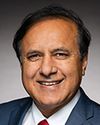Welcome to this meeting, which is basically a continuation of where we were last Tuesday when were questioning witnesses and then debated a motion.
First of all, I want to thank all of the witnesses for being here. Mr. Wolfish, it's really nice to see you in person. We really appreciate that you've come back for this one hour. It's such an interesting topic and there's so much to learn from all of you.
I can inform the committee that all of the sound tests have been done for the witnesses who are online, so we're essentially ready to go.
We had just started the second round—the five-minute round—when we started debating the motion. We're at the top of the five-minute round.
We'll start with Mr. Leslie for five minutes.




